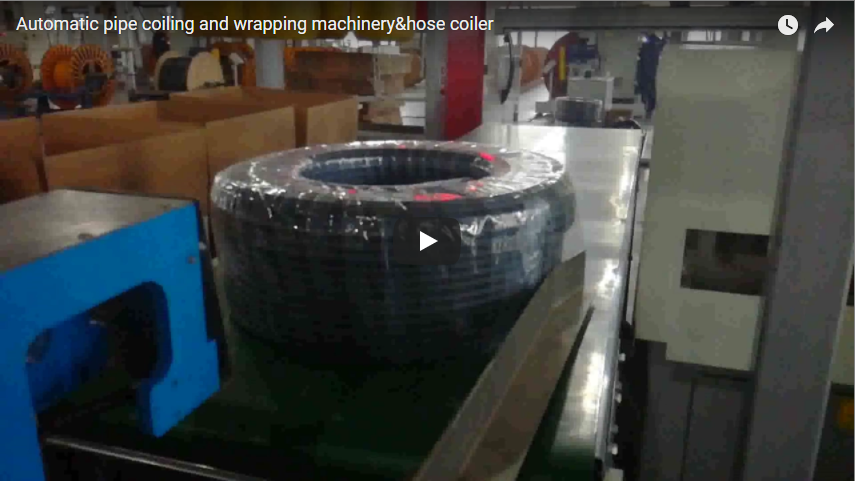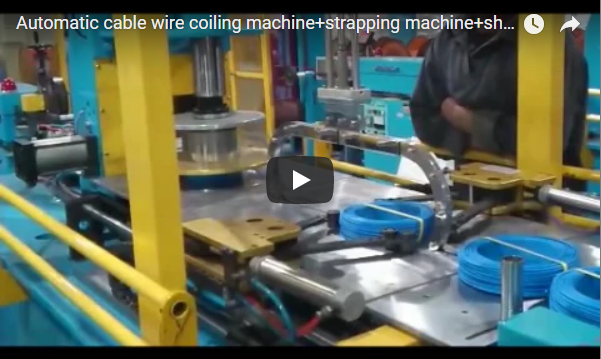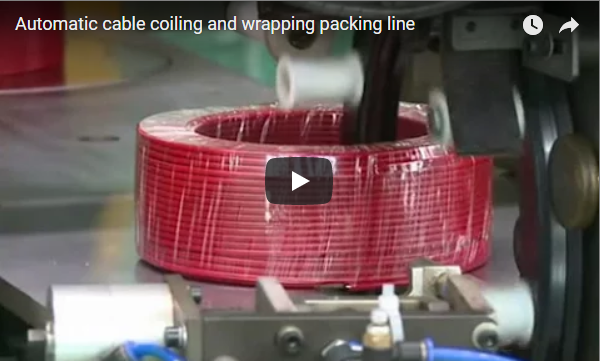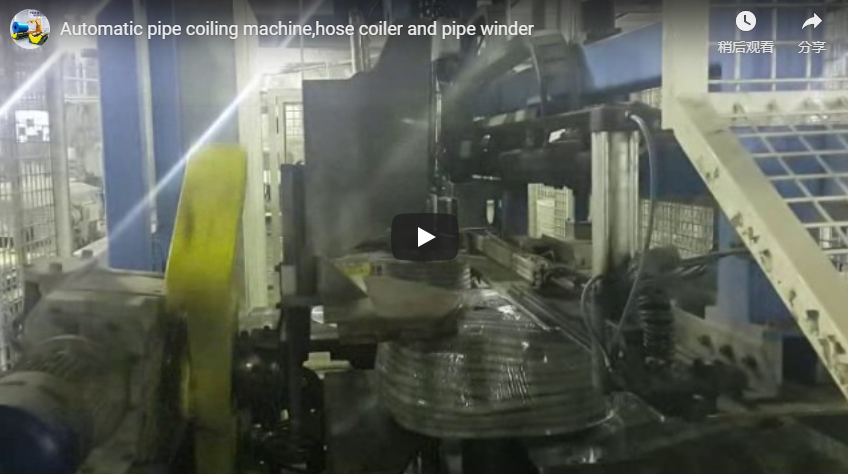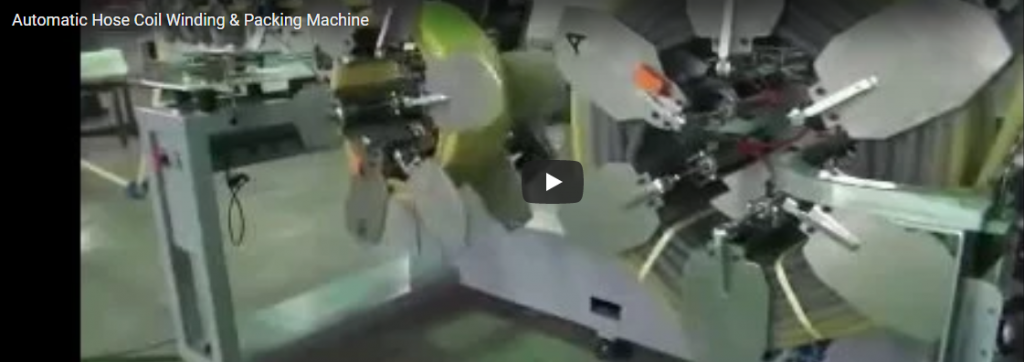Streamlining Pipe Production: Advanced Automated Coiling and Strapping Solutions Without Accumulators
The efficient handling and packaging of extruded pipes present significant challenges in modern manufacturing. Post-extrusion processes, particularly coiling and strapping, can become bottlenecks, impacting overall line speed, product quality, and operational costs. Traditional methods often rely on manual labor or semi-automated systems incorporating accumulators, which introduce complexity, require substantial floor space, and can lead to inconsistencies. This article explores an advanced solution: fully automated pipe coiling and strapping systems designed to operate seamlessly without an accumulator, directly synchronizing with the extrusion process. Drawing on innovations documented in recent patents and industry best practices, we delve into the technology and benefits of these integrated systems.
The Bottleneck: Challenges in Traditional Pipe Coiling and Packaging
In high-volume pipe extrusion, particularly for materials like PEX, PE-RT, PVC, and corrugated conduits, the downstream handling process is critical. Common issues include:
- Synchronization Hurdles: Matching the coiler speed precisely with the variable output of the extruder, especially without a buffer like an accumulator, requires sophisticated control systems. Accumulators, while providing buffering, add cost, maintenance complexity, and significant footprint.
- Manual Labor Dependency: Manual coiling and strapping are labor-intensive, slow, and prone to inconsistencies in coil dimensions, tension, and strap placement. This directly impacts productivity and introduces ergonomic risks.
- Quality Control Issues: Inconsistent coiling tension can lead to coil deformation or collapse during handling. Improper strapping can result in loose bundles or pipe damage. Manual processes often lack the repeatability needed for high-quality packaging standards.
- Operational Inefficiencies: Line stoppages for manual coil changes, strap replenishment, or dealing with tangled pipes reduce overall equipment effectiveness (OEE). Floor space constraints can also limit layout optimization.
Addressing these challenges necessitates automation that is not only efficient but also intelligent and integrated.
Technological Breakthroughs: Accumulator-Less Automated Coiling and Strapping
Modern automated systems, as demonstrated in the video, leverage several technological advancements to overcome traditional limitations, particularly eliminating the need for accumulators.
1. Direct Synchronization and Tension Control
Accumulator-less operation hinges on precise speed synchronization between the pipe haul-off unit and the coiling winder. This is often achieved through:
- Integrated Drive Systems: Utilizing servo motors or advanced vector drives for both the haul-off and the winder, controlled by a central PLC.
- Dancer Arm/Sensor Feedback: A sophisticated dancer arm or laser/ultrasonic sensors continuously monitor pipe tension or loop size, providing real-time feedback to the drive controllers. This allows the winder speed to adjust dynamically, maintaining consistent tension without excessive buffering. Patent literature frequently highlights innovations in non-contact loop control and dynamic drive algorithms for such applications (e.g., referencing concepts found in tension control systems for winding applications).
- Extrusion Line Integration: Direct communication protocols (like OPC-UA or EtherNet/IP) between the extruder controls and the coiler PLC enable predictive speed adjustments based on extrusion output changes.
Benefit: Eliminates the accumulator, significantly reducing floor space requirements, capital cost, maintenance points, and potential for pipe scuffing within the accumulator structure.
2. Precision Coiling Mechanisms
Achieving high-quality, consistent coils automatically relies on advanced mechanical design:
- Servo-Driven Traverse Winding: Precise layering of the pipe onto the coil is managed by a servo-controlled traverse guide. This ensures level winding, maximizes coil density, and prevents tangling. Control parameters allow for adjustable pitch based on pipe diameter and stiffness.
- Automated Coil Changeover: Systems feature automatic cutting, clamping of the new pipe end, and transfer to an empty winding station or automatic ejection of the finished coil, minimizing downtime between cycles. Research in robotic handling and automated transfer systems informs these designs.
- Adjustable Mandrels: Coiling heads often feature pneumatically or hydraulically actuated mandrels to accommodate various core diameters and facilitate easy coil removal.
Benefit: Consistent coil dimensions (OD, ID, width) meeting specified tolerances, improved coil stability, and reduced risk of pipe damage.
3. Integrated High-Speed Strapping
Once the coil reaches the desired length, integrated strapping units secure the bundle efficiently:
- Automated Strap Feeding and Tensioning: Machines automatically feed polypropylene (PP) or polyester (PET) straps around the coil, apply programmable tension, and secure the strap using heat sealing or ultrasonic welding – methods noted for reliability in industrial packaging studies.
- Multiple Strap Application: Systems can apply a pre-set number of straps (e.g., 2, 3, or 4) at defined angular positions for optimal coil security.
- Strapping Head Technology: Modern strapping heads are compact, fast, and require less maintenance, contributing to overall system uptime. Innovations often focus on energy efficiency and seal consistency.
Benefit: Secure, uniformly strapped coils ready for immediate palletizing or shipment, reduced strapping material waste through precise tensioning and cutting, and elimination of manual strapping labor.
4. Advanced Control Systems and HMI
The entire process is orchestrated by a Programmable Logic Controller (PLC) with a user-friendly Human-Machine Interface (HMI):
- Recipe Management: Operators can store and recall specific parameters (pipe diameter, coil length, coil dimensions, strap count, tension settings) for different products, ensuring quick changeovers.
- Diagnostics and Monitoring: Real-time monitoring of system status, alarms, and production data (e.g., coils produced, cycle times). Remote access capabilities for diagnostics and support are increasingly common, aligning with Industry 4.0 trends.
- Safety Integration: Systems are designed adhering to international safety standards (e.g., ISO 13849-1, IEC 60204-1) with safety interlocks, light curtains, and emergency stops.
Benefit: Ease of operation, reduced setup times, improved troubleshooting, enhanced safety, and potential for data integration with plant-level manufacturing execution systems (MES).
Quantifiable Performance Gains
Implementing accumulator-less automated coiling and strapping systems translates into tangible benefits, often cited in case studies and supplier documentation:
- Increased Throughput: Cycle times are significantly reduced compared to manual or semi-automated methods, often allowing the coiling/strapping unit to match the maximum output speed of modern extruders. Gains of 20-50% in packaging throughput are commonly reported.
- Labor Cost Reduction: Automation can reallocate 1-2 operators per shift previously dedicated to manual coiling and strapping, leading to significant labor cost savings and improved personnel safety.
- Floor Space Optimization: Eliminating the accumulator can free up considerable floor space (often 10-20 square meters or more), allowing for more compact line layouts or additional equipment.
- Improved Product Quality & Reduced Waste: Consistent coiling and secure strapping minimize pipe damage and deformation during handling and transport, reducing scrap rates and customer complaints. Precise material usage reduces strapping waste.
- Enhanced Operational Consistency: Automation ensures repeatable performance 24/7, eliminating variability associated with manual operations.
Typical System Specifications
While varying by application, typical parameters for such systems include:
- Pipe Diameter Range: 16 mm to 63 mm (or higher for specialized machines)
- Coil Outer Diameter (OD): 500 mm to 1400 mm (adjustable)
- Coil Inner Diameter (ID): 200 mm to 700 mm (mandrel dependent)
- Coil Width: 100 mm to 600 mm (adjustable traverse)
- Maximum Line Speed: Up to 150 m/min (application dependent)
- Strapping Material: PP or PET strap (e.g., 9-16 mm width)
- Number of Straps: 2 to 4 (programmable)
- Control System: PLC with Touchscreen HMI (e.g., Siemens, Allen-Bradley)
- Power Requirements: 400V/480V, 3-Phase, 50/60Hz (typical)
- Compressed Air: 6-8 bar
Conclusion: Optimizing the End-of-Line for Competitive Advantage
Advanced automated pipe coiling and strapping machines, particularly those employing accumulator-less designs, represent a significant step forward in optimizing pipe production lines. By leveraging integrated drive technology, precision mechanics, high-speed strapping, and sophisticated controls, these systems directly address key industry challenges related to efficiency, quality, safety, and cost. As documented in technical literature and proven in numerous installations globally, this technology enables manufacturers to streamline operations, reduce waste, improve product presentation, and ultimately enhance their competitive position in demanding markets. Investing in such automation is increasingly becoming essential for pipe manufacturers seeking to maximize productivity and meet evolving customer expectations.

